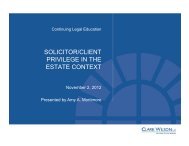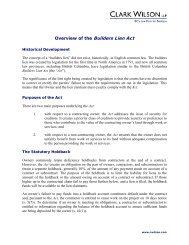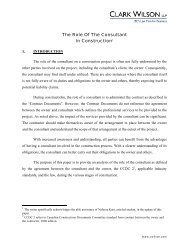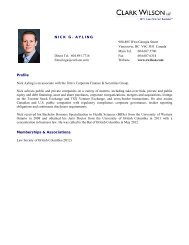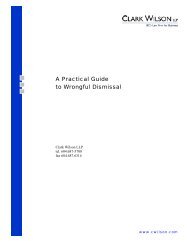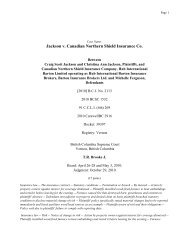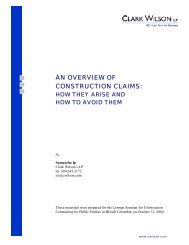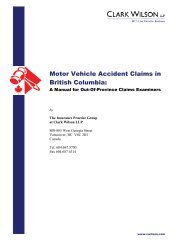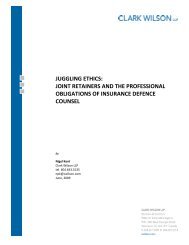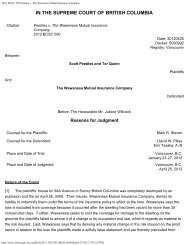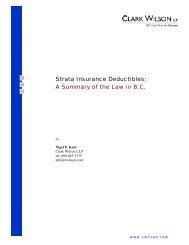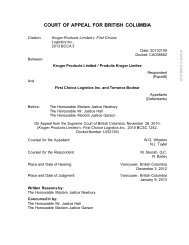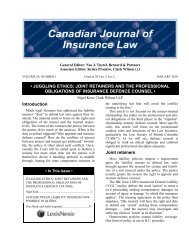in the supreme court of british columbia - Clark Wilson LLP
in the supreme court of british columbia - Clark Wilson LLP
in the supreme court of british columbia - Clark Wilson LLP
Create successful ePaper yourself
Turn your PDF publications into a flip-book with our unique Google optimized e-Paper software.
British Columbia Medical Association v. Aviva Insurance<br />
Company <strong>of</strong> Canada Page 22<br />
possibility that some or all <strong>of</strong> <strong>the</strong> damages susta<strong>in</strong>ed were caused by negligence<br />
with respect to <strong>the</strong> collision.<br />
[64] The Court concluded that <strong>the</strong>re was a duty to defend, reject<strong>in</strong>g <strong>the</strong><br />
submission that <strong>the</strong> negligence claim was purely derivative. The Court considered<br />
<strong>the</strong> possible outcomes at trial <strong>in</strong> <strong>the</strong> course <strong>of</strong> its analysis at para. 29:<br />
Hav<strong>in</strong>g said all this, I am not conv<strong>in</strong>ced that, <strong>in</strong> a case such as this, a pla<strong>in</strong>tiff<br />
could not claim that Mr. Morrison <strong>in</strong>tentionally caused <strong>the</strong> collision <strong>in</strong> an<br />
attempt to stop <strong>the</strong> Dedam vehicle from leav<strong>in</strong>g his property or, <strong>in</strong> <strong>the</strong><br />
alternative, that he caused <strong>the</strong> <strong>in</strong>juries by driv<strong>in</strong>g his vehicle <strong>in</strong> a negligent<br />
manner. It is arguable, <strong>in</strong> my view, that <strong>the</strong> two torts <strong>in</strong>volve different acts or<br />
conduct based upon Mr. Morrison's state <strong>of</strong> m<strong>in</strong>d, one be<strong>in</strong>g an <strong>in</strong>tentional<br />
tort and <strong>the</strong> o<strong>the</strong>r a non-<strong>in</strong>tentional tort. The Statement <strong>of</strong> Claim would<br />
obviously conta<strong>in</strong> a claim potentially with<strong>in</strong> coverage. At trial, <strong>the</strong> claim based<br />
upon <strong>the</strong> <strong>in</strong>tentional tort could fail and <strong>the</strong> negligence claim succeed. This is<br />
different from <strong>the</strong> allegations <strong>in</strong> Scalera where it was alleged <strong>in</strong> <strong>the</strong> Statement<br />
<strong>of</strong> Claim that <strong>the</strong> defendant had caused damages to <strong>the</strong> pla<strong>in</strong>tiff by engag<strong>in</strong>g<br />
<strong>in</strong> non-consensual sexual <strong>in</strong>tercourse. In that case, <strong>the</strong> negligence claim was<br />
not legally viable because on <strong>the</strong> facts as alleged, <strong>the</strong>re was no possibility<br />
that a claim with<strong>in</strong> coverage could succeed. That is so because "[e]i<strong>the</strong>r <strong>the</strong>re<br />
was consensual sexual <strong>in</strong>tercourse, <strong>in</strong> which case <strong>the</strong> claim would be<br />
dismissed, or <strong>the</strong>re was non-consensual <strong>in</strong>tercourse, <strong>in</strong> which case <strong>the</strong> claim<br />
<strong>in</strong> battery would succeed." In <strong>the</strong> latter case, <strong>the</strong> claim would not be with<strong>in</strong> <strong>the</strong><br />
coverage provided by <strong>the</strong> policy (see G. Hilliker, Liability Insurance Law <strong>in</strong><br />
Canada, 3d ed. (Toronto: Butterworths, 2001), at pp. 69-71).<br />
2011 BCSC 1399 (CanLII)<br />
[65] In <strong>the</strong> present case, address<strong>in</strong>g <strong>the</strong> first stage <strong>of</strong> <strong>the</strong> Scalera analysis, it is<br />
clear that Dr. Wang has properly pleaded a claim <strong>of</strong> defamation with respect to <strong>the</strong><br />
Unlawful Expressions. Dr. Wang has alleged that <strong>the</strong> Unlawful Expressions formed a<br />
part <strong>of</strong> <strong>the</strong> Individuals’ campaign <strong>of</strong> overt vilification and that all <strong>of</strong> <strong>the</strong> defendants<br />
published <strong>the</strong> Unlawful Expressions with knowledge <strong>of</strong> <strong>the</strong>ir falsity or with reckless<br />
<strong>in</strong>difference to <strong>the</strong>ir truth, for <strong>the</strong> dom<strong>in</strong>ant purpose <strong>of</strong> <strong>in</strong>flict<strong>in</strong>g <strong>in</strong>jury upon Dr. Wang<br />
and or destroy<strong>in</strong>g her reputation. It is clear that if <strong>the</strong> latter allegations were to be<br />
made out at trial, <strong>the</strong> claims would fall outside <strong>of</strong> coverage. In <strong>the</strong> alternative,<br />
Dr. Wang also advances a claim <strong>of</strong> malicious falsehood, which if made out at trial,<br />
would also fall outside <strong>of</strong> <strong>the</strong> coverage.<br />
[66] Are <strong>the</strong> defamation claims derivative? In Scalera, Mr. Justice Iacobucci<br />
concluded that <strong>the</strong> allegation <strong>of</strong> breach <strong>of</strong> fiduciary duty was derivative s<strong>in</strong>ce <strong>the</strong>re<br />
was noth<strong>in</strong>g to suggest that <strong>the</strong> breach was anyth<strong>in</strong>g but <strong>in</strong>tentional and <strong>the</strong> harm



